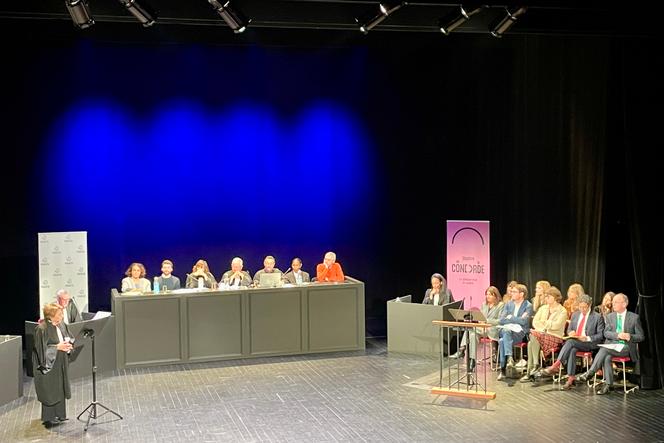


In an instant, the show went from parody to dystopia. It took just a few words from Nicolas Mayer-Rossignol, the socialist mayor of Rouen, who appeared as a witness at the mock trial in defense of the Seine river held on Monday, December 9, at the Théâtre de la Concorde in Paris.
Of course, everything was staged in this mock hearing: The judge and jurors in the center, the prosecutor to their right, the defense lawyer, the plaintiffs, the witnesses and the experts. It was a mock trial in which the subject was not the guilt of the accused but the legal protection of the victim, in this case, the Seine.
Between the fake lawyers in their robes and the deliberately somewhat cartoonish scenario, the large theater audience was quick to laugh, particularly when they heard the name of the (fake) company accused of having dumped a large toxic cocktail into the river: I Love Chimie ("I love chemistry"). "The name may make you laugh, but if I say Lubrizol, the smile disappears," reacted the mayor of Rouen, suddenly reminding the audience of the chemical plant that burned in his city in 2019.
The question of nature's legal rights is not a new one and it is increasingly being examined as threats to biodiversity grow. Five months after the Olympic Games, in which the Seine was a major player, the City of Paris wanted to play its part in the debate with this symbolic trial designed to demonstrate the limits of the law in protecting ecosystems.
Granting the Seine a legal personality would mean "giving it the power to defend itself," regardless of political alternation, argued Paris Mayor Anne Hidalgo. Former environment minister Corinne Lepage, representing the Seine, argued that a "systemic approach" would "take into account the entirety of the river's damage, from its source to its mouth."
"The cities are not asking you to compensate them for a loss that does not belong to them, but to give the river that formed them the protection it deserves," continued Patrick Klugman, a lawyer for Paris, Rouen and Source-Seine. Even former prosecutor François Molins, reprising his old role, urged the court to "underline the legislative vacuum," arguing that "the law is showing its limits and imposing a new way of looking at living things, leading to the granting of rights to nature."
Unsurprisingly, defense attorney Vanessa Bousardo failed to convince the jury that "nature is already protected by our laws," despite a fine argument on the rights and duties of legal entities. The mock court ruled in favor of the principle of legal personality for the river.
